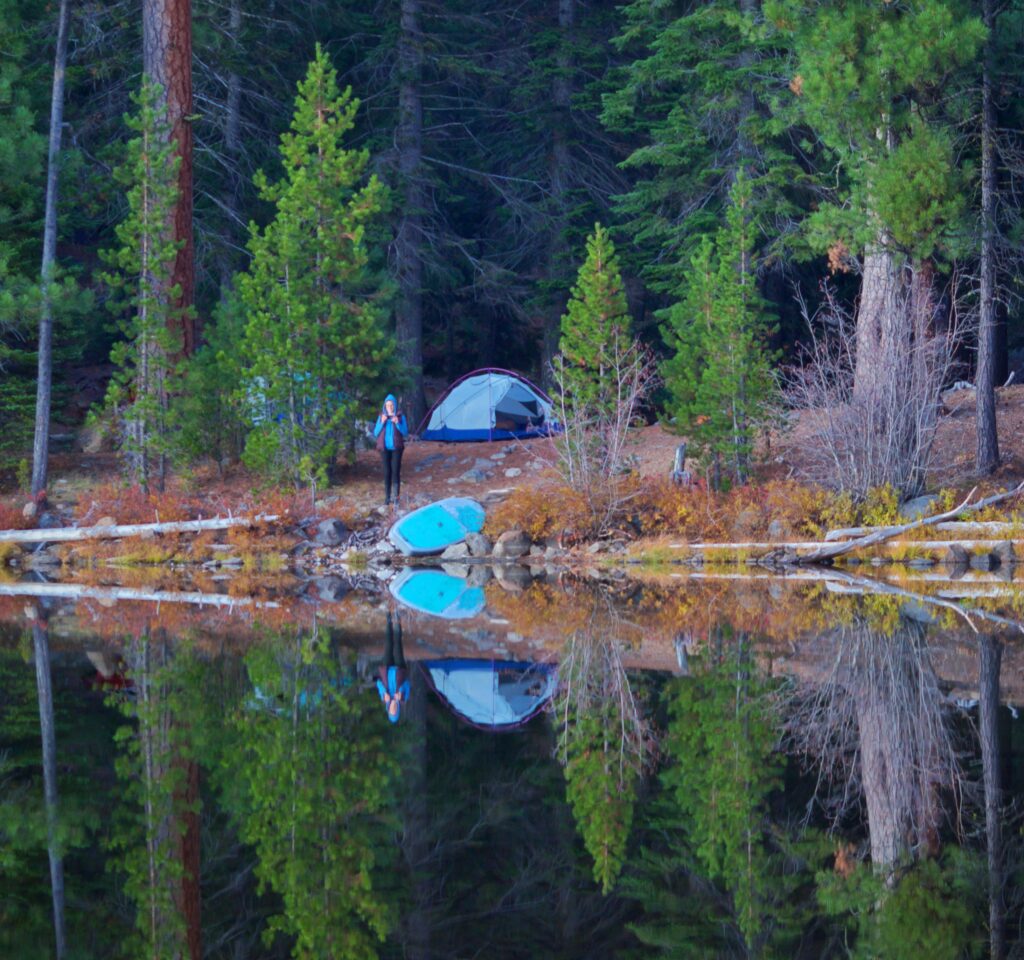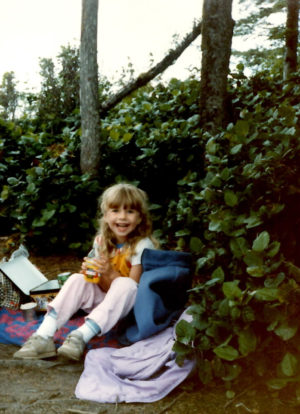Living Her Adventure profiles women in and beyond the outdoor industry who are living their fullest lives and pushing their limits. Ed. 002: Kate Blazar, Founder of Animosa.
Growing up on the Olympic Peninsula in the 1980s and 1990s, in an era of aggressive logging in that area, Kate Blazar witnessed firsthand the harm that business can wreak on the environment. “It was at a pretty young age that I took up the activist mindset and decided that my life was essentially going to be about protecting these places and helping people get outside so that they, too, could appreciate these amazing wild places,” she explained.
As the Founder of Animosa, a company that makes “Gear for Adventurous Women,” Kate’s varied path has long been grounded in leadership. After earning an undergraduate degree in geology, Kate dove into the environmental nonprofit sector and found herself in an Executive Director position by age 25. “I was pretty young and, quite frankly, over my head,” Kate said, “but it was one of the best hand-on learning experiences that I could have asked for.” Kate spent eight years with Cascadia Wildlands, an organization that advances grassroots organizing, litigation, and advocacy on behalf of public lands and wild places.
Kate remains a strong ally to nonprofit efforts, but ultimately, she found herself drawn toward the business approach to social impact. She enrolled in the MBA program at the University of Oregon “with the goal of understanding exactly how I could use business as a leverage tool for good, recognizing that we live in a world and in a country where business is powerful and money talks.”

Kate’s vision was to integrate her commitment to supporting activism, environmental protection, and adventure from Day One of her new life chapter in business, and she spent as much time outside as possible while pursuing her MBA. These were juicy trips – the genesis of Animosa came about during a rafting trip in the Grand Canyon.
“I thought to myself, ‘What if I started a company that was all about empowering women to go outside and have the kinds of experiences that are conducive to growth and discovering oneself as well as discovering these amazing places? What if I could build a company that itself is integrated with philanthropy, that supports all of these causes, and that benefit women?’” It was with this vision that Kate completed her MBA and set out to start her company.
“A lot of outdoor brands are just trying to figure out how to change their gear or apparel to fit women better. Most of them don’t actually identify where the gaps in the women’s market exist.”
Animosa makes products that women need outside – their first product, the Go With Your Flow pack, offers women a hygienic and sustainable way to manage menstrual cycles during off-the-grid adventures. Go With Your Flow was the result of a year plus of research, product design, and testing. “I wanted to make a clear statement that our first product was about tackling problems that are very specific and unique to women,” said Kate. “A lot of outdoor brands are just trying to figure out how to change their gear or apparel to fit women better. Most of them don’t actually identify where the gaps in the women’s market exist.”

Kate had recruited a friend from the nonprofit sector, Jess Southwick, to join Animosa from its earliest days. Both women brought extensive outdoor experience and a practical, no-BS attitude to Animosa’s mission. “We’re looking to make products that would enhance women’s experience, so that they can focus on other things like growth, discovery, and empowerment.” Animosa’s second specific product, the P* Off Cloth, responds to another basic but real need that women have when they’re outside. As Kate explains, these products are driven by an interest in making outdoor time safe and comfortable for women, by “tackling some of the challenges that are often left unspoken.”
“We’re looking to make products that would enhance women’s experience, so that they can focus on other things like growth, discovery, and empowerment.”
The company takes a homegrown approach to its products – all main components are made in Oregon – and its growing team, which includes a project manager, a salesperson, and a (male!) sewer share a common quality of scrappy “can do.” Kate has placed a lot of emphasis on integrating values learned on backcountry trips into her business processes. As she grew her team, Kate focused on bringing in people with a shared approach:
“Be resourceful, problem solve as you go, connect with people, lean on your community.”
While Animosa has faced some pushback for its female focus, largely in anonymous internet-forums, the reception to a women’s specific product line has been very positive overall. “A lot of our customers are men, and they’re buying products for their wives or daughters or whoever it is because they want to make that woman’s experience in the outdoors more comfortable,” said Kate. “I think it’s awesome that men are willing to go to our website and buy a ‘period kit’ for a woman they care about. That, I think, is a really exciting indicator of progress, and a sign of where we are in development in society.”
From Kate’s perspective, this is an especially energized time to be running a women’s-specific company. The #metoo movement and other evolving realities have laid the foundation for new conversations around male-female relationships and male ally-ship. Some of Animosa’s role in the broader conversation is at a practical level, and particularly about making some of those practicalities more accessible as topics. “I think it’s a combination of teaching skills and normalizing women’s experiences, along with using language that’s natural. It just makes everybody comfortable.”

Kate still sees room for improvement in Animosa’s approach to its business, especially in terms of diversity and inclusion. “It’s extremely important to us to continue to improve our language and our approach, so that we’re not being exclusive to disenfranchised groups and often-marginalized communities.” She wants to see the brand continue to work on product development that can respond to the unique needs of transgender and non-binary women and men. If that brings up some challenging or uncomfortable conversations within the Animosa community, Kate regards it as a good thing. “Change is inherently threatening to some people who don’t want to let go of the status quo; they might feel like they’re somehow going to lose power or status. No matter what kind of change it is, there are people who are going to feel threatened by it.”

Looking ahead, Animosa will continue to stay rooted in the perspectives and experiences that led Kate to start the company. Her family culture was supportive of her outdoor interests, but her wider experience in the outdoors has been varied. “I’ve certainly gone on plenty of trips with men, and have had extremely diverse array of experiences, from being treated as a sexual object to feeling super empowered and capable, like I’m the one sharing my knowledge and teaching them. Growing up around my family, I was taught that I have just as much of a right to be adventuring outside as anybody else.”
And Animosa will continue to support healthy representations of women in the outdoors – a principle that’s grounded in Kate’s own experience. “I wish that as a young person I had had mentorship or guidance from women who were really able to convey to me where my worth is based, and why I should love myself in ways that are not connected to pleasing, or attracting, anybody else.” By creating products that reduce obstacles to being outside, and through philanthropic partnerships like Animosa’s support of The Cairn Project and other organizations, the brand will continue to work to “move the needle” in the right direction, as Kate says.
Adventure will remain front and center for Kate, in Animosa and beyond. “I want to continue to push myself, to have more experiences, which means more adventuring,” said Kate. “It means adventuring with different types of people, in different places, doing different things – but in all parts of my life, it means putting myself in situations and places which are uncomfortable, and sitting with that. It means intentionally diving into things that I don’t understand or that are potentially scare me.”

Justine Mulliez
In March 2019, Ambassador Justine Mulliez set out to ski and splitboard the 33-mile Crater Lake Rim Route and find some extra elevation and good lines along the way. Read more Justine’s experience on her blog, Just A Wild Thought.
